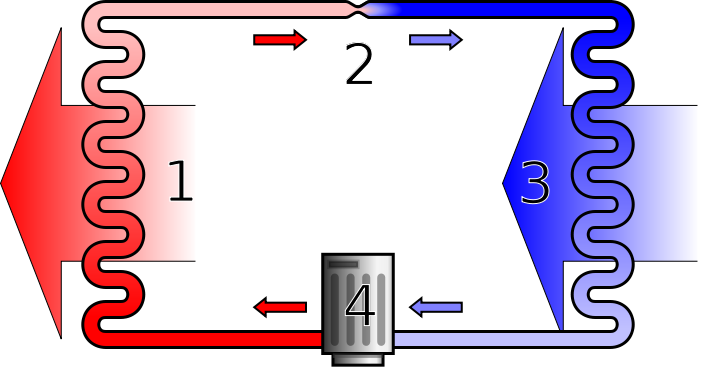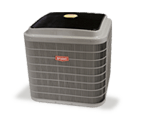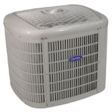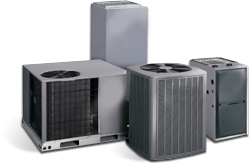As we, in Maryland, begin to see signs of summer, out thoughts turn to the most efficient and effective way to cool our homes. While many still opt for the conventional air conditioning and heating systems, others are choosing to reduce their electrical bills by “pumping up” – having a heat pump installed.
The first heat pump was developed and built by Peter von Rettinger between the years 1855-1857.

A simple stylized diagram of a heat pump’s vapor-compression refrigeration cycle: 1) condenser, 2) expansion valve, 3) evaporator, 4) compressor [Thanks to: Wikipedia]
A heat pump utilizes the spontaneous flow of heat from warm spots to cooler places. Heat pumps absorb heat from a cold spot and release it to a warmer one, and vice-versa. So, in the summer, a heat pump will use refrigerant to release the hot air outdoors while in the winter it will push the heat indoors.
WHAT ARE THE ADVANTAGES AND DISADVANTAGES OF A HEAT PUMP?
Advantages:
1) Since heat pumps transfer heat instead of generating heat, they are capable of conditioning the same space at as little as one quarter of the cost of operating conventional heating or cooling appliances. an air-source heat pump can deliver one-and-a-half to three times more heat energy to a home than the electrical energy it consumes. Translation? Lower utility bills in many parts of the country
2) Heat pumps tend to distribute heat more evenly than conventional central heating systems and are a good choice for homes where natural gas is not available.
3) Modern day heat pumps’ efficiency and performance is one-and-a-half to two times greater than those available 30 years ago thanks to the newest technology:
Disadvantages:
1) Heat pumps are most effective in certain climates. If you live in a climate where sub-freezing temperatures are a rare deviation form otherwise mild weather, your heat pump will operate like a rock-star. Boston, Upstate New York, Minnesota, Chicago – your heat-pump may not operate quite as effectively during your frigid air but backup burners are an excellent supplement to keep you warm.
2) Heat emerging from a heat pump is often not as intense as that provided by a typical furnace. It will, however, warm your home evenly and turn off and on less frequently than other systems.
3) The bad news? Heat pumps can have problems with low airflow, leaky ducts, and incorrect refrigerant charge. The good news? Room heat pumps and packaged heat pumps are charged with refrigerant at the factory, and are seldom incorrectly charged. The even better news? AMS has you covered! Our service calls routinely include a check of your refrigerant level to ensure the proper functioning of your heat pump.
Bryant Evolution Carrier Infinity Series


PUMP IT UP RIGHT!
When selecting your heat pump, here are some factors to consider:

To compare the various kinds of heat pumps, their SEER levels and other features, feel free to click on the following links (there are others, but we’ll just get you started):
https://www.bryant.com/products/heatpumps/comparison.shtml
https://www.carrier.com/residential/en/us/
https://www.amana-hac.com/products/heat-pumps
STAY TUNED FOR OUR NEXT BLOG ABOUT OTHER KINDS OF HEAT PUMPS (GEOTHERMAL, ETC.) !










